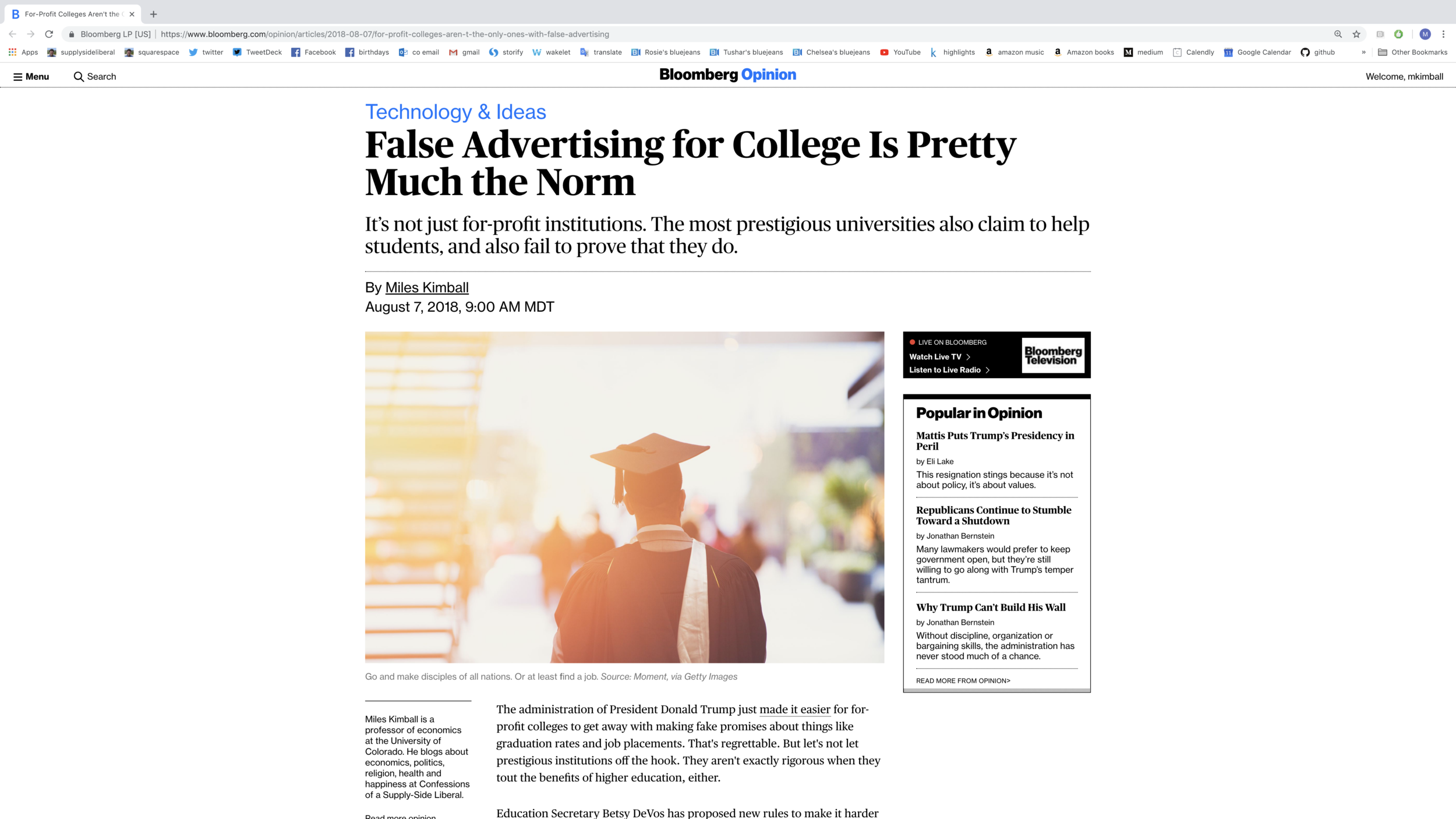Bloomberg #2—>False Advertising for College is Pretty Much the Norm
“False Advertising for College is Pretty Much the Norm” is my second piece as a Bloomberg columnist. I am grateful to Bloomberg Opinion for permission to reprint the full text of my column here. They retain all rights. You can see links to all my other columns in the popular press here.
For those who want a deeper dive into one of the points I mentioned, here is an ungated link to Stacy Dale and Alan Krueger's paper "Estimating the Payoff to Attending a More Selective College: An Application of Selection on Observables and Unobservables."
The administration of President Donald Trump just made it easier for for-profit colleges to get away with making fake promises about things like graduation rates and job placements. That's regrettable. But let's not let prestigious institutions off the hook. They aren't exactly rigorous when they tout the benefits of higher education, either.
Education Secretary Betsy DeVos has proposed new rules to make it harder for students to get loan forgiveness from schools that lured them with false advertising. Notably, the government wants to make aggrieved students show that the schools actually intended to defraud them, a high burden of proof.
The problem is that the prestige schools have undermined the case for making it easy to go after the bad ones, which just pretend to provide an education without really delivering. Though most colleges and universities mean well, they are also responsible for false advertising and don't always deliver the education they promised. If all institutions of higher education were held to higher standards, it would be easier legally to penalize the worst.
Colleges and universities claim to do two things for their students: help them learn and help them get jobs. It's hard to find even one college or university that provides solid data to back up these claims.
On job placement, the biggest deception by prestigious colleges and universities is to claim credit for the brainpower and work habits that students already had when they arrived. Another important deception is to obscure the difference between the job-placement accomplishments of students who graduate from technical fields such as economics, business, engineering or the life sciences, and the lesser success of students in the humanities, fields like communications or in most social sciences.
Solid data to back up a claim that a school helps students find jobs should include the following:
Graduation rates for different types of students,
The current jobs of graduates, separated out by major and year of graduation.
Data on the other schools a student was admitted to. That’s to identify the consensus view of admissions departments at many schools about the brainpower and work habits a student already had before entering college.
It's no wonder that schools don’t want to provide such data, given what the facts would probably show. Many students incur large educational loans going to a prestigious school but still can’t get a good job. And the economists Stacy Dale and Alan Krueger, former head of the Council of Economic Advisers, used data on which other schools a student was admitted to in a 2002 paper that casts doubt on the benefit from going to a more prestigious school instead of a less prestigious school.
To demonstrate that a school helps students learn, schools should have every student who takes a follow-up course take a test at the beginning of each semester on what they were supposed to have learned in the introductory course. The school can get students to take it seriously enough to get decent data — but not seriously enough to cram for it — by saying they have to pass it to graduate, but that they can always retake it in the unlikely event they don’t pass the first time. To me, it is a telling sign of how little most colleges and universities care as institutions about learning that so few have a systematic policy to measure long-run learning by low-stakes, follow-up tests at some distance in time after a course is over.
When I hear people talk about “fly-by-night” schools, the image I get is one of a “no-name” school with bad intentions. But for a school to meet its implied warranty, it is not enough for it to have a famous name and good intentions. We need to be able to distinguish between good and bad actors.
It's unlikely that colleges and universities will be held to high standards anytime in the next few years given the Trump administration’s strong push toward deregulation. But the next administration could go a long way toward turning the world of higher education right-side-up if it were to require all colleges and universities receiving federal funds to publicly post data on graduation rates and jobs of graduates by major, and provide systematic data to researchers on the other schools a student was admitted to and on long-run student learning.
